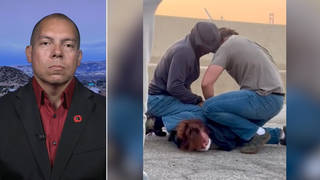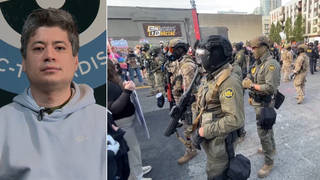
Guests
- George Retessuing the Trump administration over his unlawful detention by ICE.
- Marie Millerattorney for George Retes.
We speak with George Retes, a 25-year-old U.S. citizen and Army veteran who is taking on the federal government after he was detained by ICE for three days and three nights without explanation. Retes was arrested during a raid in July at a cannabis farm in Camarillo, California, where he worked as a security guard. Retes was driving to work when he encountered a checkpoint, where agents broke his car window, pepper-sprayed him and dragged him out of his vehicle for arrest. While he was jailed without charge, Retes missed his daughter’s third birthday.
“They never let me call my family. They never told me what I was charged for. They just kind of threw me in there and didn’t care,” Retes tells Democracy Now!
“These are basic violations of George’s federal constitutional rights and his rights under California law,” says his attorney, Marie Miller, who is suing the government over what happened to Retes in the hopes of setting a precedent to stop the same thing from happening to others.
Transcript
AMY GOODMAN: This is Democracy Now!, democracynow.org. I’m Amy Goodman.
We end today’s show looking at the Trump administration’s mass immigration raids as federal agents round up thousands of people nationwide, including U.S. citizens. George Retes is a 25-year-old U.S. citizen, a disabled Army veteran, who’s taking on the federal government after he was detained by ICE for three days and nights without charge, arrested during a raid in July on a cannabis farm in Camarillo, California, where he worked as a security guard.
Retes was driving to work when he encountered a checkpoint. He says agents broke his car window, pepper-sprayed and violently dragged him out from his vehicle. One officer put a knee on Retes’s neck. Another put a knee on his back. During his time in custody, Retes says, he was denied access to a lawyer, prevented from contacting his family, placed in an isolation cell. As he remained jailed, Retes missed his daughter’s third birthday. He’s now filing a legal claim against the Trump administration.
Jaime Alanís, a farmworker, died after falling from the roof of the greenhouse during that same immigration raid.
For more, we’re joined by George Retes, his attorney, Marie Miller, with the Institute for Justice, as well.
Thank you both for being with us. George, explain what happened. We told your story over and over again. It’s a relief to be able to speak to you directly.
GEORGE RETES: Yes. Do you want the story from the beginning?
AMY GOODMAN: Yes, please.
GEORGE RETES: I was on my way to work, like any other day, except today there was protests going on. There was cars. Apparently, there was a raid on my work. And so, when I show up, all this is going on. There’s piles of cars. I make my way to the front, and there’s a wall of ICE agents blocking anyone from going. I pull up, and I stop in front of them. I get out my car and try to explain that I’m a U.S. citizen, that I’m just trying — I’m just trying to get to work. I’m not there to protest them. I’m not there to fight them. I’m just trying to get to work. I didn’t think it would be a problem, as long as I told them what was going on. They got hostile. They didn’t care what I had to say. They started yelling at me to do different things.
It was at that point they started walking towards me. I got back in my car, and they surrounded my car. They reversed me to get out of the way for them. I got out of the way. Their cars drove by. And then, it was after all that they reapproached my car. They threw tear gas behind me. The tear gas got into my car. And they started banging on my driver’s side and passenger’s side window. There was cars in — there was ICE agents in front of my car, telling me to reverse, telling me to pull over to the side, all while other agents are pulling on my door handle, trying to — trying to rip my door open, trying to get me out of the car, all while other agents are telling me to do different things. No one was in charge.
AMY GOODMAN: You told them —
GEORGE RETES: Yeah.
AMY GOODMAN: — you’re a U.S. veteran. You told them you’re a U.S. citizen. What was their response, after they smashed your window?
GEORGE RETES: Their response was no response. I was guilty of anything they had thought I was. They didn’t need an excuse for anything they did. They just did it.
AMY GOODMAN: So, when did you join the military? And can you talk about how long you served?
GEORGE RETES: I joined the military in 2018, and I served for four years.
AMY GOODMAN: And now you were serving as security on this farm?
GEORGE RETES: Yes. I decided to take after security when I got out.
AMY GOODMAN: And when they — several of the agents put their knee in your back, put their knee on your neck?
GEORGE RETES: Yes, yes, one agent put their knee on my neck, and another agent put their knee on my back, all while, like, four or five other agents stood around and watched and just let it happen. They just stood there and watched.
AMY GOODMAN: Part of your jailing, you were held with a professor?
GEORGE RETES: Yes, the very first night, they put us in a cell with one — they put me in a cell with one other person, and it was the professor who was arrested that day.
AMY GOODMAN: George, you missed your daughter’s third birthday?
GEORGE RETES: Yes, yes, I did. It’s something I’ll never get back, and it sucks.
AMY GOODMAN: Were you able to call home? Were you able to call a lawyer?
GEORGE RETES: No, they didn’t give me a chance to at all. I asked when I would be able to speak to a lawyer. They never gave me anything. They never let me — they never let me call my family. They never told me what I was charged for. They just kind of threw me in there and didn’t care. No reason to throw me in there.
AMY GOODMAN: I want to bring in Marie Miller with the Institute for Justice. Can you explain the legal course you’re taking now with George Retes, a U.S. Army veteran, disabled, security on this farm, held for three days and nights?
MARIE MILLER: Sure. So, it’s not easy to hold the federal government and its officials accountable when they violate individuals’ constitutional rights. But George is trying, and he’s doing everything he can to do that. What he’s done now is file administrative claims against the federal agencies that are involved. And the reason for that is that there’s a statute called the Federal Tort Claims Act, and it is one of the most viable ways to hold the federal government accountable for violating people’s constitutional rights. But one requirement before a person can sue the federal government under that statute is that the person needs to file their claims with the responsible federal agencies first, giving those agencies a chance to resolve the claim themselves. And they have six months to do that, so this Federal Tort Claims Act puts in this six-month waiting period before a person can even enter the courthouse door to sue the federal government for rights violations. Now, it’s not the only way to hold the federal government accountable, but it’s become one of the most viable ways in recent years, as other paths to accountability have been practically cut off for most people who are victims of civil rights violations by the federal government.
AMY GOODMAN: Marie Miller, officials at Homeland Security released a statement saying, “George Retes was arrested and has been released. He has not been charged. The U.S. Attorney’s Office is reviewing his case, along with dozens of others, for potential federal charges related to the execution of the federal search warrant in Camarillo.” Your response?
MARIE MILLER: Yeah, there have been no charges brought. George was never told why he was being detained. When he was released, he was given a form that just says he was detained pursuant to arrest. That’s no explanation for his three-day, three-night detention, much less without a phone call, without a hearing before a judge, without access to an attorney, without a shower, with pepper spray all over his body. These are basic violations of George’s federal constitutional rights and his rights under California law.
AMY GOODMAN: And, George, you were transported to a Navy base first?
GEORGE RETES: Yes, I was transferred to the Port Hueneme Navy base —
AMY GOODMAN: And then?
GEORGE RETES: — first. And then, from there, they did our fingerprints and took our picture. And from there, they took us to the detention facility in downtown L.A.
AMY GOODMAN: George, if you can talk about what it means? I mean, you were an Iraq War veteran. You were in a law enforcement-adjacent job — right? — doing security. Has it changed your view of law enforcement in this country?
GEORGE RETES: I wouldn’t say it changed my view of law enforcement, because, I mean, we’re a nation of laws. Someone has to uphold those laws. So, it’s just important to hold everyone accountable, to make sure that no one is above the law. It doesn’t matter who you are, what you do. Everyone — everyone has to follow the law. Everyone needs to be held accountable. And I think that’s super important, especially for people who don’t get the chance to speak or are too scared to speak. Someone has to hold people accountable.
AMY GOODMAN: And, Marie Miller, I want to ask you, finally — the Institute for Justice recently won a Supreme Court case with a family in Atlanta whose home was wrongly raided by an FBI SWAT team. We just have 30 seconds.
MARIE MILLER: That’s right. The Institute for Justice, along with the clients, won that case at the Supreme Court. That was a Federal Tort Claims Act case, and that case is back down at the 11th Circuit for further proceedings. George’s situation is proceeding under the same act, Federal Tort Claims Act, alongside other potential avenues for relief. And our position is that when officers violate federal constitutional rights, there has to be some way to hold them accountable in court; otherwise, our rights are simply illusory.
AMY GOODMAN: I want to thank you both for being with us, Marie Miller, with the Institute for Justice, and George Retes, a 25-year-old U.S. citizen, U.S. Army veteran, who worked as a security guard and was taken by ICE and held incommunicado for three days and nights. That does it for our show, I’m Amy Goodman. Thanks so much for joining us.













Media Options